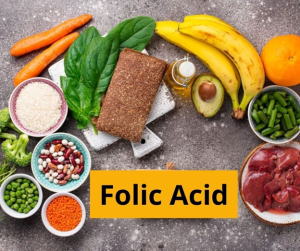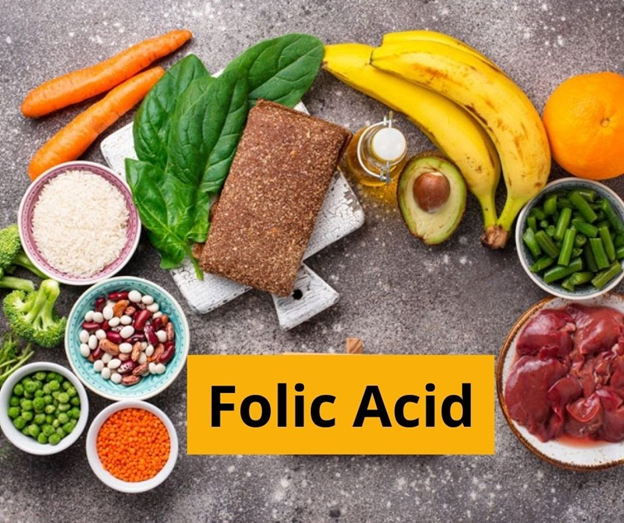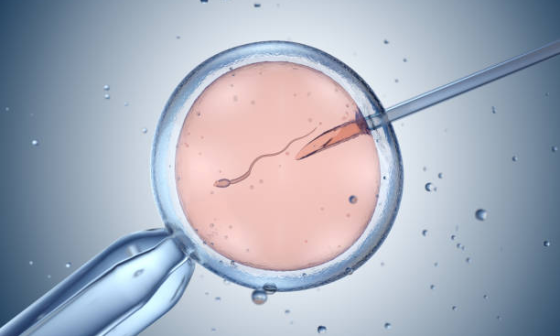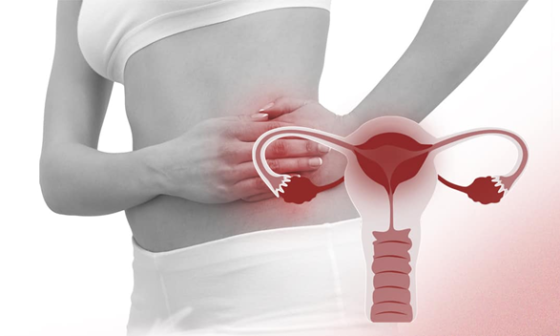Introduction
You may have heard of folic acid and you might be wondering why and if it is important only to women, especially pregnant women. The answer is No! Folic acid is a synthetic form of folate- vitamin B9 essential for preserving general health and well-being, present in enriched foods and supplements. Despite being frequently linked to pregnancy, its advantages are universal and do not depend on an individual’s age or gender.

Source: Iliveactive
Benefits and Importance of Folic Acid
● Promotes cell healing and repair
Folic acid is necessary for cell growth and function because it is necessary for DNA synthesis and repair. This is especially crucial for tissues that are growing or repairing quickly, such as the skin and its appendages like the hair and, digestive tract. Sufficient levels of folic acid promote proper cell division and integrity.
● Aids with fetal development and pregnancy
The prevention of neural tube defects (NTDs) including spina bifida and anencephaly is a well-known benefit of folic acid. For optimal fetal development and to lower the risk of birth abnormalities, women who are pregnant or intend to become pregnant must take folic acid supplements.
● Boosts immune response
A sufficient amount of folic acid is necessary for a robust immune system. The synthesis and operation of white blood cells, which are essential for preventing infections and sustaining immune function, are aided by this vitamin. Getting enough folic acid can help strengthen your body’s defences against disease.
● Supports heart health
In the presence of folic acid, Homocysteine, an amino acid that can raise the risk of cardiovascular disorders, is reduced, thus helping maintain heart health. Folic acid lowers the risk of heart disease, stroke, and other cardiovascular disorders by promoting normal homocysteine levels.
● Improves brain function
For mental and cognitive health, folic acid is essential. It encourages the neurotransmitter (brain messenger) synthesis, which is necessary for brain function. A decreased risk of mental health conditions like anxiety and depression as well as cognitive decline has been associated with adequate folic acid intake.
● Aids in the prevention of Anaemia
Red blood cells cannot be produced without folic acid. Megaloblastic anaemia, which is defined by the development of excessively large and defective red blood cells, can result from a folic acid deficiency. The symptoms of Megaloblastic anaemia include paleness, fatigue, and weakness. Anaemia can be prevented and treated with an adequate folic acid intake.
● Improves skin health
Folic acid supports the renewal and repair of skin cells, which leads to healthy skin. It preserves the suppleness and appearance of the skin, which is especially advantageous as you age. Dermatitis and early ageing of the skin can result from folic acid deficiency.
● Enhances digestion
Maintaining a healthy digestive system requires folic acid. It facilitates the appropriate operation of the gastrointestinal system, helps in its normal function, and guards against ailments like constipation. Your nutrient absorption, general health, and well-being depend on a healthy digestive tract.
● Advantageous to women’s health
Folic acid benefits women’s health outside pregnancy and is a crucial reason why you should ensure to reach your required daily intake of folate. Folic acid has been found to lessen premenstrual syndrome symptoms and assist control of menstrual cycles. Adequate folic acid intake can promote general hormonal balance in women who are getting close to menopause.
● Beneficial to male reproductive health and fertility
Folic acid has been found to improve fertility, especially in sub-fertile men. Zinc and folic acid are frequently offered together as supplements that are meant to increase male fertility. These supplements have been the subject of several investigations and have been found that these supplements may increase fertility in men who are having fertility problems.
Sources of Folic Acid
Although it is usually advised to take supplements, you can also get more folic acid through food.
- Leafy green veggies and fruits- bananas, spinach, cabbage, oranges, peaches, and citrus fruits are good sources.
- Carbs like whole grain breads, wheat, potatoes
- Meat such as liver (the best source), kidney, egg yolk
- Avocado seeds and nuts
A supplement may be helpful if your diet isn’t supplying enough folic acid for you, however, it’s always a good idea to speak with a doctor before taking any new supplements.
Recommended Daily Intake Of Folic Acid
- 400 mcg for adults over 19,
- 300 – 400 mcg for men,
- 500 mcg for lactating mothers, and
- 600 mcg for expectant mothers.
Conclusion
Everyone can benefit from folic acid, an important mineral that supports cellular health and improves heart and brain function. Adding folic acid to your daily routine is a wise and advantageous move, regardless of your reasons for taking it—you could be planning a family, becoming pregnant, or just trying to stay as healthy as possible. You’re being proactive about your health.
Wellahealth is aware that although folic acid is necessary for good health, it is not a cure. For optimum well-being, a balanced diet, frequent exercise, enough sleep, and affordable health coverage are essential. We offer health coverage for as low as 2000/month which provides you and your family with consultations, laboratory tests, and genuine medications. Contact us to get started today!
To stay proactive and aware of your health, read up on similar health topics from our blog.
Dr Ifeoma M. Uduh, Dr John Afam Osemene






